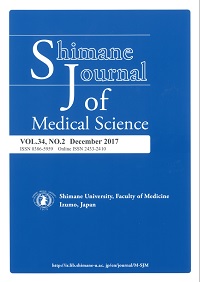Shimane University Faculty of Medicine
ISSN :0386-5959(in print)
ISSN :2433-2410(online)


These article are licensed under a Creative Commons Attribution-NonCommercial-NoDerivatives 4.0 International License.
number of downloads : ?
Use this link to cite this item : https://ir.lib.shimane-u.ac.jp/7561
Shimane Journal of Medical Science 28 1
2011-12-01 発行
Express of the Prolactin Receptor in Japanese Breast Cancer
Nio, Yoshinori
Iguchi, Chikage
Tsuboi, Kazuhiko
Nishi, Takeshi
Hashimoto, Koji
Takamura, Michio
Takeda, Hiroshi
Omori, Hiroshi
Koike, Makoto
Sato, Yoshitoshi
Endo, Shinichiro
Ogo, Kazumasa
Yamaguchi, Kazushige
Tsuji, Munechika
Toga, Tomoko
File
Description
Prolactin (PRL) is associated with lactation, and also plays an important role in the development and progression of breast cancer (BC). PRL exerts its effects via its receptor, the PRL-receptor (PRLR), so it is beneficial to study the distribution and alteration in expression of PRLR in order to elucidate the biologic effects of PRL on BC. In 84 BCs, PRLR expression was examined by an immunohistochemical technique. PRLR immunoreactivity was detected mainly in the cytoplasm. And the overall positive rate (cut-off > 10%) was 71% (60/84), while invasive BC showed a significantly higher positive rate (75%, 57/76) than non-invasive BC (38%, 3/8) (p=0.0264). The PRLR expression showed no correlation with age, primary tumor, nodal involvement, distant metastasis, or clinical stage; however, it was significantly correlated with estrogen receptor (ER) expression (p=0.0361), especially in invasive BC (p=0.0098), but not with the progesterone receptor (PgR) expression or HER-2 expression. PRLR was highly expressed in IDC ( invasive ductal carcinoma) and correlated with ER expression, suggesting that PRL and PRLR may play important roles in the development and progression of ER (+) BC.
About This Article
Other Article
Is it Possible to Predict the Onset of Side Effects in Patients Treated with Subcutaneous Buserelin?
PP. 21 - 26
PP. 27 - 34
